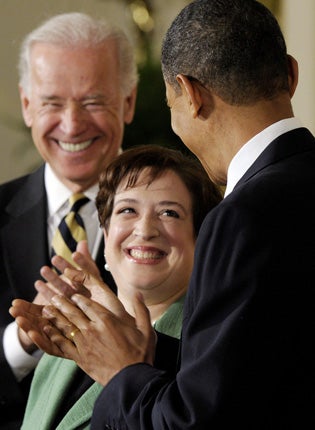Obama plays it safe with latest pick for Supreme Court bench
With tricky elections looming, President's selection of Elena Kagan reflects his desire to avoid months of wrangling with Republicans. David Usborne reports

Steering a cautious path on a decision that may inform his legacy, President Barack Obama yesterday nominated his Solicitor General, Elena Kagan, to the United States Supreme Court. She would bring to three the number of women justices serving on the country's top legal bench, a historic breakthrough.
Ms Kagan, who at 50 also stands out because of her relative youth, would replace the liberal-leaning John Paul Stevens, who is retiring. While most experts consider it unlikely that the Republicans will try to block her confirmation at Senate hearings, the choice will prompt some reservations not just from the conservative right but from Mr Obama's liberal-left base as well.
Indeed, the choosing by any president of a Supreme Court nominee never passes by without some high drama. A vacancy gives the White House an opportunity to alter the ideological and intellectual profile of an arm of government that directly impacts the lives of the citizenry, and to do so for decades.
Mr Obama's new pick might be tailor-made for a president anxious to avoid too scalding a battle at a potentially hazardous moment; the November mid-term elections are around the corner. A former dean of the Harvard Law School, Ms Kagan has a record that puts her closer to the centre of the political spectrum than Justice Stevens.
With a long record of teaching as well as serving both the Obama and Clinton White Houses, Ms Kagan has also never been a judge before. This too may help to ensure a smoother confirmation process. Judges come with welters of writings out of which Republicans might have trawled potentially damaging intelligence. The first woman dean of the Harvard Law School, Ms Kagan was called a "trail-blazing leader" by Mr Obama. "While we can't presume to replace Justice Stevens' wisdom or experience, I have selected a nominee who I believe embodies that same excellence, independence, integrity and passion for the law, and who can ultimately provide that same kind of leadership on the court," he said.
Ms Kagan was low-key in accepting the nomination. "Through most of my professional life I have had the simple joy of teaching, of trying to communicate to students why I so love the law," she said, "because law matters, because it keeps us safe, because it protects our most fundamental rights and freedoms and because it is the foundation of our democracy".
A likely flashpoint in the hearings may be the attempts made by Ms Kagan while at Harvard to keep military recruiters off the campus in Cambridge, Massachusetts, because of her opposition to the Don't Ask, Don't Tell law that restricted the ability of gays and lesbians to serve. The episode was being singled out by some conservatives as evidence that Ms Kagan is more attached to political activism than to protecting the law. "I'm deeply disappointed that President Obama has chosen to nominate an individual who has demonstrated a lack of adherence to the limits of the Constitution and a desire to utilise the court system to enact her beliefs of social engineering," said David McIntosh, a former Congressman from Indiana and conservative activist.
Elsewhere, observers underscored that by replacing Justice Stevens with Ms Kagan, the President was missing an opportunity to strengthen the court's liberal wing. His core supporters were similarly disappointed with his choice last year of Sonia Maria Sotomayor, who also was not regarded as a clear-cut liberal. As Solicitor-General, for example, Ms Kagan has supported giving the White House rein on maintaining some of the Bush-era policies regarding state secrets and habeas corpus restrictions in the "war on terror".
"You now have two nominees that were selected by President Obama who were more conservative than the people they replaced," noted Jonathan Turley of the George Washington Law School. "So Obama is moving the court to the right – something that most people would not have imagined."
Ms Kagan's liberal defenders argued that while she is not a firebrand, her status as a persuasive moderate would help to gain the support of the court's long-time swing vote, Anthony Kennedy, more often. "The core of Kagan's experience over the past two decades has been all about moving people of different beliefs to the position she believes is correct," wrote Lawrence Lessig, a Harvard law professor. "Not by compromise, or caving, but by insight and strength."
Join our commenting forum
Join thought-provoking conversations, follow other Independent readers and see their replies
Comments